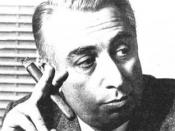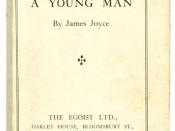What is a historical context and can texts be explained or enriched by considerations of context?
A definition of the phrase 'historical context' is the historical 'circumstances that form the setting for an event, statement or idea, and in terms of which it can be fully evaluated and assessed'1. In looking at the historical context of literature there are different strains that can be looked at; such as the writer's context, the text's context, the readings context and the language context.2 When applied to literature, this way of reading clearly opens up a great deal of information to consider. As a result, certain movements of literary criticism are out rightly opposed to reading texts with attention to context.
Cleanth Brooks, an American formalist critic of the twentieth century believed that; 'Speculation on the mental processes of the author takes the critic away from the work into biography and psychology'3. He ascertains that the work itself should be studied, not the creation of it; examining the author's life 'describes the process of composition, not the structure of the thing composed'4.
In other words, biographical information is surplus to requirements and gets in the way of analysing the text for what it is.
Roland Barthes (1915-1980) was one of the leading figures in French structuralism and in his landmark essay, 'The Death of the Author' (1968) he attacked the act of examining the author's intentions as a means of understanding the text more thoroughly, 'The image of literature to be found in ordinary culture is tyrannically centred on the author.'5 Barthes believed that to attain the 'ultimate meaning'6 , the biography and psychology of the author should be cast aside by the reader and the focus should instead be on the text, 'It is language that speaks not the author.'7
However, only...


